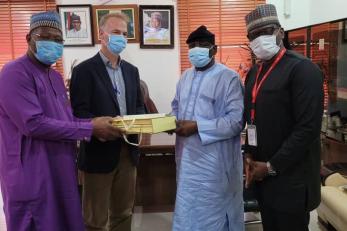Improving access to WASH, conflict mitigation and agriculture in Adamawa

To ensure further progress on its resilience-building programs in Adamawa - a key state in the conflict-challenged North East, a high-level delegation from Mercy Corps, an international humanitarian organization, is engaging top officials of the state government for strategic discussions.
The high point of the engagements was a visit by a Mercy Corps team led by Africa Regional Director, Sean Granville-Ross, and Country Director Ndubisi Anyanwu to the Adamawa State Deputy Governor, Mr. Crowther Seth.
Mercy Corps representatives expressed their appreciation to the state government for providing a conducive environment for the implementation of the organization’s programs designed to strengthen citizen, government, and market capacities at various levels.
The engagements focused on strengthening partnership with government stakeholders, and improving synergy between the three Mercy Corps’ programs - COMITAS, Feed the Future Rural Resilience Activity, and Small Town Wash (STW) in the state, in line with the government’s priorities for development.
“While COMITAS focuses on addressing farmer/herder issues, building resilience, managing conflicts, and supporting economic development in the state, the Feed the Future program is targeted at improving food security,” said the Country Director.
“Small Town Wash is a five-year project sponsored by the USAID to promote water sanitation and hygiene in small towns (with populations between 5,000-20,000) recovering from the aftermath of the security challenges in Adamawa, Yobe, and Borno states,” he added.
The Mercy Corps team shared some of the positive outcomes recorded by the three programs so far.
Under the Rural Resilience program, Mercy Corps Nigeria, in partnership with the Adamawa State Ministry of Agriculture is building the capacity of citizens and providing demo plots for farmers to learn best farming practices and technologies. So far, 118 demonstration plots have been established in seven LGAs and 248,000 individuals are registered to benefit from the program.
In addition to increasing farming capacity, Mercy Corps is also training citizens on conflict sensitivity dialogue to understand dynamics of relationship and impact and roles that market, private actors, and government actors play in escalating or de-escalating triggers of conflict, as well as providing direct cash transfers to citizens to contribute in alleviating negative impacts of COVID‑19 on the economy.
Under the Small-Town WASH program, Mercy Corps is providing boreholes, latrines, and fecal sludge management in small towns within the state to improve hygiene.
Speaking on the importance of the ongoing interventions, Sean Granville-Ross mentioned that much of Mercy Corps’ work is dependent on strong partnerships with the government, highlighting how significant the state's Agro-Climatic Resilience in Semi-Arid Landscapes (ACReSAL) plan aligns greatly with two of the programs - COMITAS and Rural Resilience Activity.
On behalf of Governor Fintiri, Deputy Governor Seth thanked Mercy Corps for its contributions to the state government’s ongoing efforts to improve the lives of the people and tackle challenges posed by the insurgency in various parts of the state.
He instructed the Permanent Secretary of the Ministry of Water Resources to send a memo outlining Mercy Corps’ requests on advancing its programs for further action.
Mercy Corps team also inspected an abandoned water facility in Vinikland – a small town in Adamawa state. Plans to revamp the facility under Mercy Corps’ Small Town Wash program are making significant progress.
The team also had productive discussions with the Permanent Secretaries of the Ministries of Livestock, Environment, and Water Resources on improving program implementation and synergy with the government’s priorities.